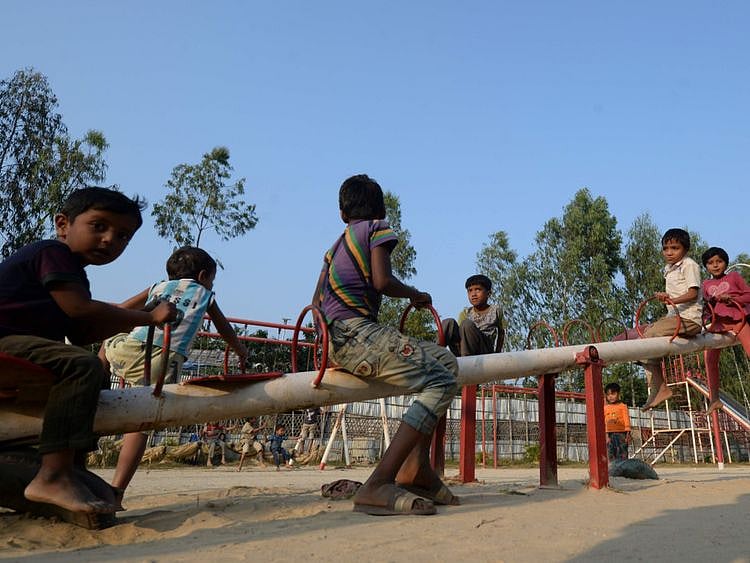Standing on the precipice of a new decade as winter draws in, I can think of few stories more tragic or more urgent from the last ten years than the global refugee crisis. The United Nations High Commissioner for Refugees (UNHCR) estimates that 3.8 million Syrian and Iraqi internally displaced persons (IDPs) and refugees are now in need of winterisation assistance in Egypt, Iraq, Jordan, Lebanon and Syria. For many, this will be their ninth consecutive winter as refugees in the Middle East.
Turkey’s refugee population, swelled by 3.6 million Syrians, became the largest in the world in 2018, while one in six people in Lebanon were refugees — the highest density in the world. Sadly, for all the times this human catastrophe has punctured the public consciousness with harrowing images of desperate, drowned children, the news agenda outside the Middle East has moved on with the West focused on Brexit and the US election cycle.
But we cannot ignore the brutal reality that one in every 108 people on the planet is displaced. Those forcibly displaced increased by 2.3 million people in 2018, totalling almost 70.8 million individuals by the year’s end as a result of persecution, conflict, violence, or human rights violations. There are now even more people displaced than during the Second World War — more than at any time in human history.
The world is still failing its most vulnerable sons and daughters by not opening up safe routes to sanctuary and resettling all those in need. Each and every upturned boat in the Mediterranean is another harrowing reminder of that failure written in blood.
Sadly, even when refugees make it to the safety of a new country, the world continues to fail them every day they are kept from their birthright of a decent education. As a teacher, and as a champion of Education Cannot Wait [programme] speaking up for all those children whose education is disrupted by conflicts and disasters, this is one of the greatest injustices of all.
Unesco’s Global Education Monitoring report 2019, Migration, displacement and education: Building Bridges, Not Walls shows just how laws and policies are letting down migrant and refugee children by “negating their rights and ignoring their needs”. Refugees are frequently denied entry into schools that could prove a safe haven and offer the promise of a better future. This is sometimes down to just simple paperwork, lack of data or bureaucratic and uncoordinated systems, but the result is that many fall through administrative cracks. Even when refugees have qualifications, they face many hurdles entering national education systems in their host countries if they do not have the documents to prove them.
Unesco data shows the number of migrant and refugee school-age children around the world has increased by 26 per cent since 2000 and could fill half a million classrooms. In the two years since the landmark New York Declaration for Refugees and Migrants in 2016, refugees missed 1.5 billion days of school. Many refugees can only get educated in separate, non-formal, community-based or private schools, some of which are not certified. Those in detention centres in many countries often get no education. A lack of language tuition is often a barrier to refugees integrating successfully and finding work. Compounding the problem, it is poorer nations who host the lion’s share of the world’s refugees and their education systems lack the resources to cope.
As such, I welcome the fact that after a decade of stagnation, aid to education is finally increasing. In particular, the EU took a great stride this year when it announced 10 per cent of its humanitarian aid budget would be dedicated to education, 10 times that of 2015. But we must do more. It is vital the international community continues to increase its education aid, not only to help poorer nations achieve the Sustainable Development Goal of universal education by 2030, but in recognition of the fact these countries are often on the front lines of educating refugees. More than half of the world’s refugee children do not go to school and that is a direct result of a lack of funding for refugee education.
One of the things that has given me real hope is Unesco’s new Qualifications Passport, established under the guidance of Assistant Director-General for Education Stefania Giannini, that will help include refugees and vulnerable migrants into national education systems in their host countries by ascertaining their qualifications regardless of whether they have documentation. It will help migrants and refugees get into school, build on their existing qualifications to access further education in host countries and enable them to go on to gain relevant employment.
We need more imaginative remedies of this kind to tackle the education time bomb that ticks at the heart of the refugee crisis. The Middle East in particular, and the world at large, must promise to make 2020 the year we act to provide it.
— Peter Tabichi is the winner of the Global Teacher Prize 2019
Sign up for the Daily Briefing
Get the latest news and updates straight to your inbox
Network Links
GN StoreDownload our app
© Al Nisr Publishing LLC 2026. All rights reserved.
